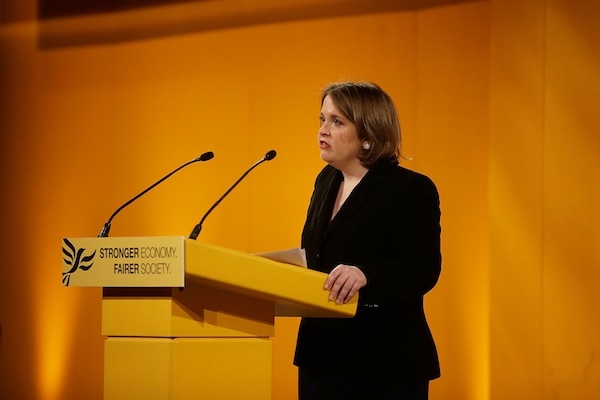Lib Dem members have just voted overwhelmingly in favour of an emergency motion on secret courts which repeated calls for the party’s parliamentarians to delete the second half of the Justice and Security Bill. During the debate, the leading campaigner against secret courts, Jo Shaw, who has spoken to Coffee House a number of times about activists’ opposition to the legislation, resigned as a Liberal Democrat on stage. Shaw stood in the 2010 general election, and is a barrister by trade. She had tried repeatedly to meet Nick Clegg to express members’ concerns about the Bill, but it was only recently that she was granted that meeting. Yesterday she was deeply unimpressed with Clegg’s description of some of the anti-secret courts arguments as ‘hyperbolic’.
In today’s debate, Shaw said:
‘The party which stood up against 42-day detention, ID cards and the excesses of the War on Terror is now led by those who on this crucial issue employ the same shoddy logic and who have fallen into the same anti-democratic realpolitik as the Blair government. So I have to say: “It’s not me, Nick, it’s you.” Therefore I am today resigning from the Liberal Democrats.’
After the debate, she said that she hoped the ‘party finds its principles and its soul again’.
Julian Huppert and Simon Hughes both spoke in the debate, with Hughes insisting that there wasn’t a parliamentary majority in favour of scrapping part II. But I’m not quite sure that this is necessarily the case. There is a group of Conservatives who were unhappy with some parts of the Bill, and some of them rebelled in votes last week. Andrew Tyrie, the Tory chair of the Treasury Select Committee, has even written a paper condemning the legislation as ‘neither just nor secure’. But my understanding, from conversations I’ve had with those on all sides, is that those Tories would have been happy to go much further in their opposition to the legislation had there been a more co-ordinated response on the Lib Dem side.
It’s worth remembering that Labour is currently in full opportunistic opposition mode at the moment. There is sufficient time before the 2015 election for the party to scent rebellion on the Coalition benches and jump in to exploit this to maximum advantage. There is a chance that the parliamentary majority against the Bill doesn’t exist because there wasn’t a sufficient uprising from the Lib Dems themselves who would have set off a chain of opposition within the House of Commons.







Comments